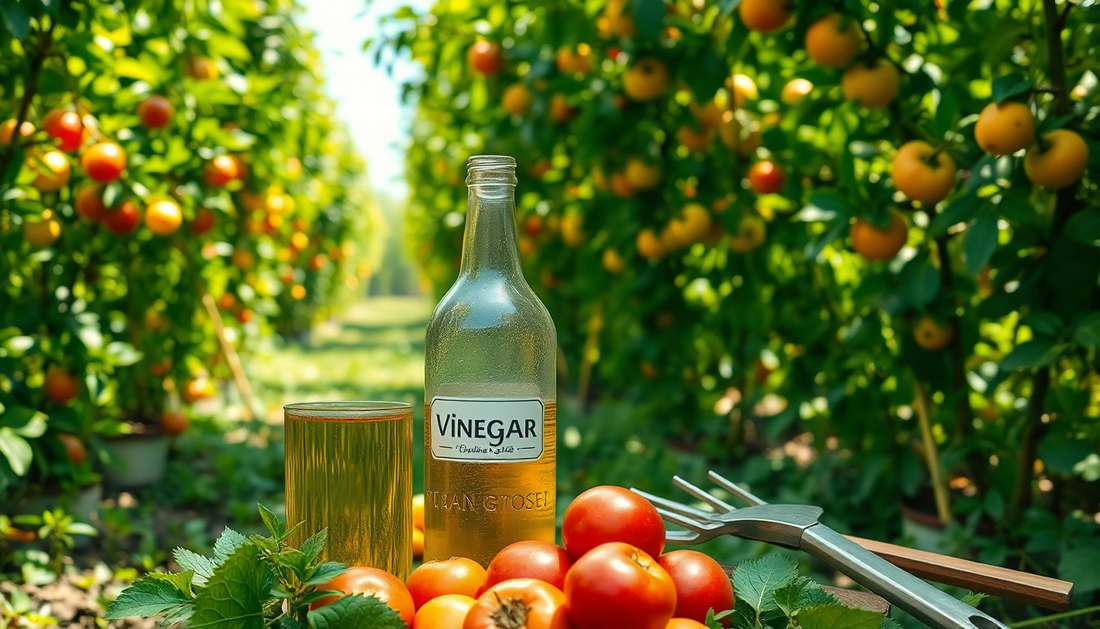
Vinegar: The Unexpected Ally in Your Fruit Garden
In the ever-evolving world of organic gardening, one natural solution has been quietly making waves - vinegar. This unassuming pantry staple has proven to be a powerful weapon against a common scourge of fruit gardens: fungal diseases. As the demand for sustainable and eco-friendly gardening practices continues to grow, understanding the benefits of vinegar as a natural fungicide is crucial for any fruit grower.
The Versatility of Vinegar
Vinegar, in its various forms, has long been hailed as a versatile household cleaner and preservative. However, its applications extend far beyond the kitchen. When it comes to the health and vitality of your fruit trees and bushes, vinegar can be a game-changer.
Fighting Fungal Infections
One of the primary benefits of using vinegar in the garden is its ability to combat fungal diseases. Many common fruit tree and berry bush ailments, such as powdery mildew, black spot, and rust, are caused by fungal pathogens. Vinegar's acidity makes it an effective natural fungicide, capable of disrupting the growth and spread of these harmful fungi.
Promoting Plant Health
In addition to its fungicidal properties, vinegar can also help to strengthen the overall health and resilience of your fruit plants. When used as a foliar spray or soil amendment, vinegar can help to balance the pH of the soil, creating an environment that is less hospitable to fungal growth. This, in turn, can lead to healthier, more vigorous plants that are better equipped to withstand disease and environmental stresses.
Cost-Effective and Eco-Friendly
One of the most appealing aspects of using vinegar as a fungicide is its affordability and environmental friendliness. Compared to synthetic chemical fungicides, vinegar is a relatively inexpensive and readily available solution. Moreover, as a natural product, it poses minimal risk to the surrounding ecosystem, making it a safe choice for both you and your garden.
Putting Vinegar to Work in Your Fruit Garden
Now that you understand the benefits of vinegar as a natural fungicide, let's explore how you can incorporate it into your fruit garden management practices.
Foliar Sprays
One of the most effective ways to use vinegar in your fruit garden is as a foliar spray. By mixing a solution of vinegar and water, you can create a potent fungicide that can be applied directly to the leaves and stems of your fruit plants. This method is particularly useful for targeting active fungal infections, as the vinegar can help to inhibit the growth and spread of the pathogen.
Soil Amendments
In addition to foliar sprays, vinegar can also be used as a soil amendment to help maintain optimal pH levels and create an environment that is less conducive to fungal growth. By incorporating vinegar into your soil, you can help to balance the pH and provide your plants with the nutrients they need to thrive.
Preventative Measures
While vinegar can be an effective treatment for existing fungal infections, it can also be used as a preventative measure to help reduce the risk of future outbreaks. By regularly applying vinegar-based solutions to your fruit plants, you can create a protective barrier that helps to ward off fungal pathogens before they have a chance to take hold.
Mastering the Art of Vinegar-Based Fungicide
Implementing a vinegar-based fungicide regimen in your fruit garden requires a bit of experimentation and attention to detail. Here are some tips to help you get the most out of this natural solution:
Choosing the Right Vinegar
Not all vinegars are created equal when it comes to fungicidal properties. For the best results, opt for a high-quality, undiluted white vinegar or apple cider vinegar. These varieties tend to have a higher acidity level, which is essential for effectively combating fungal pathogens.
Dilution Ratios
When mixing your vinegar-based fungicide, it's important to find the right balance between vinegar and water. A good starting point is a 1:10 ratio of vinegar to water, but you may need to adjust this based on the specific needs of your plants and the severity of the fungal infection.
Timing and Application
Timing is crucial when using vinegar as a fungicide. For best results, apply your solution early in the morning or late in the evening, when the sun's intensity is lower. This will help to prevent the vinegar from burning the leaves or causing other damage to your plants.
Monitoring and Adjusting
As with any gardening practice, it's important to closely monitor the results of your vinegar-based fungicide applications and make adjustments as needed. Pay attention to the health and appearance of your fruit plants, and be prepared to tweak your approach if you're not seeing the desired results.
Embracing the Power of Vinegar
By harnessing the power of vinegar as a natural fungicide, you can take a significant step towards creating a thriving, sustainable fruit garden. Whether you're battling an existing fungal infection or looking to prevent future outbreaks, this versatile household staple can be a valuable ally in your organic gardening arsenal. So, the next time you reach for the vinegar in your kitchen, consider how it can also benefit the health and vitality of your fruit plants.








No comments